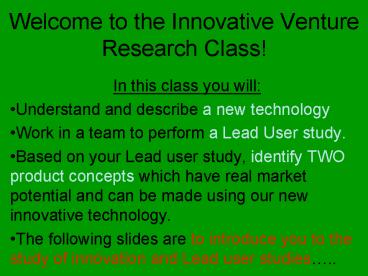Welcome to the Innovative Venture Research Class - PowerPoint PPT Presentation
1 / 12
Title:
Welcome to the Innovative Venture Research Class
Description:
Based on your Lead user study, identify TWO product concepts which ... Adopter Categories. as estimated by Rogers. Next comes Dr. Frank Bass, 1969. who said : ... – PowerPoint PPT presentation
Number of Views:37
Avg rating:3.0/5.0
Title: Welcome to the Innovative Venture Research Class
1
Welcome to the Innovative Venture Research Class!
- In this class you will
- Understand and describe a new technology
- Work in a team to perform a Lead User study.
- Based on your Lead user study, identify TWO
product concepts which have real market potential
and can be made using our new innovative
technology. - The following slides are to introduce you to the
study of innovation and Lead user studies..
2
The study of innovation starts with Everett
Rogers, 1962
- Rogers asked When a new innovative product is
introduced, what makes people adopt it early
versus later? - He categorized people based on the time it took
for them to adopt a new innovative product, and - He identified characteristics about the
innovation that affect its speed of adoption.
3
The study of innovation starts with Everett
Rogers, 1962
MORE ON THESE CHARACTERISTICS IN A LATER CLASS
PERIOD!
- Rogers asked When a new innovative product is
introduced, what makes people adopt them early
versus later? - He categorized people based on the time it took
for them to adopt a new innovative product, and - He identified characteristics about the
innovation that affect its speed of adoption.
4
Adopter Categoriesas estimated by Rogers
5
Next comes Dr. Frank Bass, 1969 who said
- The innovators are the first persons to find out
about and adopt/buy a new innovative product. - Everyone else is an imitator ---- they adopt
what the innovator has already found out about
after they see him benefiting from it. - If there are a lot of innovators then the
adoption process takes place more quickly
6
Dr. Frank Bass said
- If there are many innovators the adoption curve
looks like
If few innovators, then adoptions reach a peak
more slowly
7
Next comes Dr. Eric von Hippel
- Dr. von Hippel said that Since imitators imitate
innovators If we find out what needs innovators
have now, well know what the imitators will want
later. - He called the innovators Lead Users because
they lead the market.
8
von Hippel said
- To find Lead Users, we look for people who
- Face the needs that will be general in the
market, but well before the general marketplace
realizes the needs. So we find people who are
at the leading edge of trends and so are very
knowledgeable about state of the art solutions. - Will benefit significantly by obtaining a
solution to those needs, and will spend resources
trying to solve those needs because its more
important to them than the average person.
9
Primary vs. Secondary Research
- Secondary Research using existing (already
gathered) information to identify trends and find
names of people who may be Lead users that we
can talk to. - A Lead user study/interview is a form of Primary
Research building new information. Other
examples of Primary Research include Surveys,
Focus groups and empirical/experimental
observations.
10
Lead User Primary Research
- We can ask Lead Users to tell us about
- Competing solutions ways the problem is being
solved now - Weaknesses of the current solutions - may
represent needs that your technology can fill
better - Level of Market interest ( innovators) size and
share the seller can hope to obtain - Possible business models our plan to target a
market and make it easy for them to adopt our
product so commercialization takes place.
11
Lead User Primary Research
MORE ON BUSINESS MODELS and MARKET SIZE IN LATER
CLASS PERIODS!
- Contacting Lead Users will tell us about
- Competing solutions ways the problem is being
solved now - Weaknesses of the current solutions - may
represent needs that your technology can fill
better - Market interest ( innovators) size and share
- Possible business models our plan to target a
market and make it easy for them to adopt our
product so commercialization takes place.
12
Its time to watch the (2) von Hippel Lead user
videos































